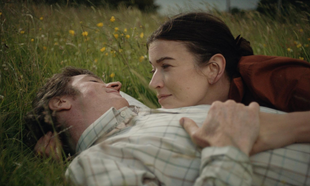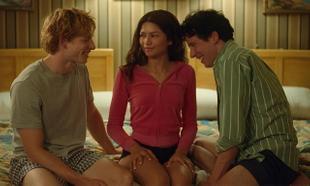Martin Provost's biopic of Violette Leduc follows the same vein as his 2008 Cesar Award-winning biopic of French painter Séraphine Louis. Both films are less interested in conventional three-act structure (Violette unfolds over five ‘chapters'), both are about a seemingly uncultured middle aged woman who have a hitherto untapped artistic bent, and both were desperately lonely proto feminists who are a touch unstable. It's also quite dull for stretches.
"Ugliness in a woman is a mortal sin" is the line that opens Violette and it's this shackled thinking that the bisexual Leduc, played with a beautiful balance of warmth and desperation by Emmanuelle Devos, must overcome. Her love for Maurice Sachs during WWII goes unrequited but he does encourage her to write and so, despite being crippled with low self-esteem, Leduc musters up the courage to approach her hero, Simone de Beauvoir (a cold and distant Kiberlain), with her manuscript. De Beauvoir loves it, in her cold and distant way, and the anxious Leduc is smitten forever. But recognition doesn't come, and neither does love…
Taking us from 1945 to the publication of The Bastard in 1964, Provost has an unsentimental take on the subject's life story. The apartments are small and grubby but not slum-like, the struggles with art are felt but not torturous, the rejections are stony but not cruel. The reactions to her taboo-breaking writing isn't shunning or rioting – it's a review in a newspaper. Maybe the director was channelling Kiberlain's de Beauvoir in his matter-of-fact approach. He doesn't take the easy option and say it's all men's fault either.
Men are largely absent or useless here but they're not oppressors. Sachs is a bounder, Camus is supposed to turn up but doesn't, and Gamet blunders about. Only Guérin (Gourmet) offers some semblance of integrity, offering to finance Leduc's career, but he too fails her when his homosexuality is a barrier from wanting her, which is all she wants, all she thinks a woman needs/deserves/expects. Provost lends the topic a gentle touch for the most part (at one stage a man offers to fetch coal because, "It's a man's job," which is a bit clumsy).
Shorn of the emotional peaks and troughs one expects, Violette can lapse into repetitiveness at times but Provost and Devos always manage to kick start interest again.










































































